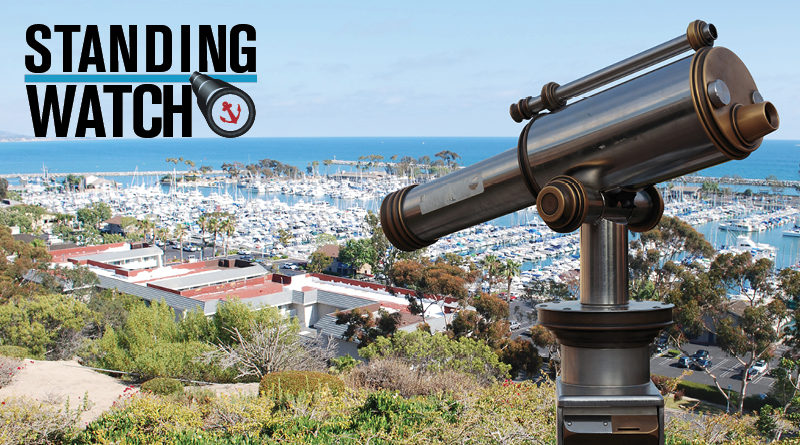U.S. Coast Guard Documentation: Know Your Paperwork
Read the application’s fine print to be sure you’re not unnecessarily filing through a third party.
SOUTHERN CALIFORNIA — The devil is always in the details – and this rings especially true whenever a “Vessel Renewal Courtesy Notice” shows up in your mailbox.
Maintain a vigilant eye whenever you receive such a notice, as not all renewal notifications are created equally. There are times when a third party, not the U.S. Coast Guard, sends you a renewal notice. The notices themselves look official and might lead you to believe it was mailed directly from the Coast Guard.
To be fair there are plenty of legitimate third party document filing services, such as Mary Conlin in Newport Beach and Dona Jenkins in San Diego. Both offer document-assisting services to commercial and recreational boaters.
Nonetheless boat owners should be savvy when reviewing renewal notices for their Certificates of Documentation, or CODs. Third party service providers, as they are known, often charge additional fees to file the same paperwork boaters can complete on their own.
Third party service providers often assist with the paperwork process, Frank Boice, a vessel examiner with the Coast Guard, told The Log. Oftentimes a third party might come in handy to deal with certain complexities of the application or renewal process – especially when it comes to the vessel’s flag or potential commercial operations.
Boice advised boaters to study the renewal notice closely. While the notices might all look alike at first glance, there are always clues as to whether the correspondence was sent directly from the Coast Guard or a third party service provider.
The Log recently reviewed a notice letter sent to one of our readers and found language indicating the correspondence was sent from a private party.
“U.S. Vessel Documentation, a private firm, has assisted thousands of boaters in applying for and obtaining U.S. Coast Guard Certificates of Documentation as well as other documentation,” the final sentence of the letter’s first paragraph read.
The same letter also informed the boater, he or she, “[is] under no obligation to utilize our firm’s service.”
“There are third party parties who cover all the application documents and send them into the center, and obtain documents for the boat owner, on their behalf,” Boice said. “I have never seen a document put out by a third party that pretends to be very similar in looks to a real Certificate of Documentation – that would be a scam.”
The Coast Guard issued a Marine Advisory in May to warn boaters of third party service providers. Safety Advisory 01-17 specifically stated third party service providers are not at all affiliated with or endorsed by the Coast Guard.
All registrations documents – such as Form CG-1270 – are processed at the Coast Guard’s National Vessel Documentation Center, or NVDC, in Falling Waters, West Virginia.
“The NVDC is aware that there are commercial entities that offer to manage the certification/renewal process on behalf of vessel owners for a fee. The Coast Guard does not endorse any of these companies, and the companies do not operate on behalf of the Coast Guard in any way,” the marine advisory, issued May 16, stated. “Any fees charged beyond the $26 renewal fee, to include other fees found in title 46 CFR 67.550, or other agreements offered by such companies are in no way associated with the NVDC certification process.
“In addition, these companies are not authorized to issue any form of documentation, including travel letters and/or permits that authorize operation of ANY vessel,” the marine advisory continued.
Oftentimes the website listed on the third party service provider is a dead giveaway. Any websites ending in .us, .com or .org are not Coast Guard affiliated or approved websites. (The specific Coast Guard website for official COD paperwork is uscg.mil/nvdc/.)
The vessel examiner added boaters could also differentiate a Coast Guard notice from third party notifications by reading what’s written on the second page of the letter – if there’s another sheet attached in the first place.
The second sheet of paper would provide explicit instructions of where on the boat a boater must place the document number associated with the application/COD. The lack of such instruction likely means you did not receive a formal notice from the Coast Guard.
Of course just because you received a notice of COD renewal from a third party service provider is not necessarily a bad thing. Third party specialists are actually valuable for anyone who does not want to fill out the required paperwork themselves (or don’t fully understand the technical terminology associated with the administrative process).
All vessels subject to the COD process must be 75 percent U.S.-owned, regardless of whether the ownership group is a collection of individuals or a formal corporation. The vessel must also be 75-percent U.S.-owned if you want to use it for commercial purposes. A third party service provider could assist applicants in verifying all legalities and making sure the boat owner(s) are properly filling out the necessary paperwork.
Coast Guard officials are also available to assist boaters with COD paperwork. Boice stated a boater could contact any local vessel examiner and request assistance.
Form CG-1270 is valid for one year after issuance and is required for vessels engaging in commercial trade. The form is optional for vessels of 5 net tons or larger and, according to the Coast Guard, “engaged in recreational use/activities.”


